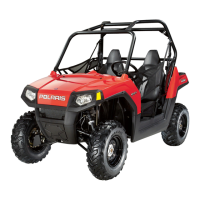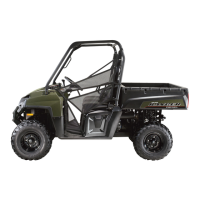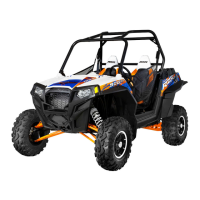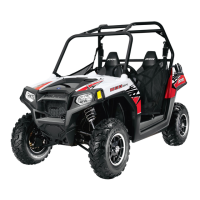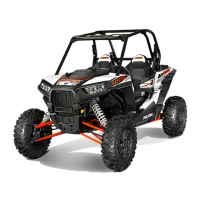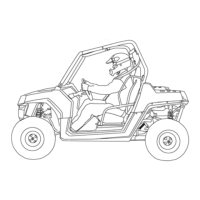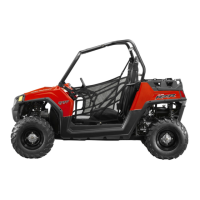ELECTRICAL 5 - 22
November 2007 GEM Service Manual
BATTERY SAFETY
Improper use and care of batteries can result in
serious personal injury or property damage. Always
observe the following safety precautions:
• The battery produces explosive gases. Keep
sparks, flame or cigarettes away. Always wear
safety goggles or face shield when working
near battery.
• The battery contains toxic materials. Do not
damage battery case. If case is broken or
damaged, avoid contact with battery contents.
Neutralize acid spills with baking soda and
water solution. Properly dispose of a damaged
or worn-out battery. Check with local authorities
for proper disposal methods.
• Do not short circuit battery. Severe fumes and
fire can result.
WARNING: EXPLOSIVE GASES, CIGARETTES,
FLAMES OR SPARKS COULD CAUSE
BATTERY TO EXPLODE. ALWAYS SHIELD
EYES AND FACE FROM BATTERY. DO NOT
CHARGE OR USE BOOSTER CABLES OR
ADJUST POST CONNECTIONS WITHOUT
PROPER INSTRUCTIONS OR TRAINING. KEEP
VENT CAPS TIGHT AND LEVEL.
WARNING: POISON/ACID CAUSES SEVERE
BURNS. BATTERIES CONTAIN SULFURIC
ACID. AVOID CONTACT WITH SKIN, EYES OR
CLOTHING. IN THE EVENT OF ACCIDENT
FLUSH WITH WATER AND CALL A PHYSICIAN
IMMEDIATELY.
FIRST AID TREATMENTS
• External contact: Flush immediately with
plenty of water.
• Internal: Call a physician immediately. Then
drink large quantities of water or milk: Follow
with milk of magnesia, beaten egg or vegetable
oil.
• Eye contact: Flush with water for 15 minutes.
Get prompt medical attention.
There are many tools that may help in properly
caring for and maintaining batteries. Below is a list
of basic items that GEM recommends for this task:
WARNING: ALWAYS WEAR PROTECTIVE
CLOTHING, GLOVES, AND GOGGLES WHEN
HANDLING BATTERIES AND ELECTROLYTE.
WARNING: DO NOT SMOKE NEAR BATTERIES.
RECOMMENDED EQUIPMENT
• Wrench
• Post Cleaner
• Distilled Water
• Baking Soda
• Voltmeter
• Vaseline – Battery Terminal Protectant Spray
• Hydrometer
• Goggles & Gloves
• Discharge Machine
Batteries should be carefully inspected on a regular
basis in order to detect and correct potential
problems before they can do harm. It is a great idea
to start this routine when the batteries are first
received.
1. Examine the outside appearance of the battery.
• Look for cracks in the container
• The top of the battery, the posts, &
connections should be clean, free of dirt,
fluids, and corrosion. If batteries are dirty,
refer to the Cleaning section for the proper
cleaning procedure.
• Repair or replace any damaged batteries.
2. Fluids on or around the battery may be an
indication that electrolyte is spilling, leaching, or
leaking out. Leaking batteries must be repaired
or replaced.
3. Check all battery cables and their connections.
• Look closely for loose or damaged parts.
• Battery cables should be intact. Broken or
frayed cables can be extremely hazardous
• Replace any cable that looks suspicious.
4. Tighten all wiring connections to the proper
specification (see below). Make certain there is
good contact with the terminals.

